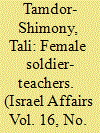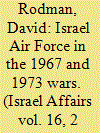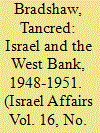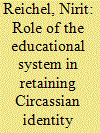|
|
|
Sort Order |
|
|
|
Items / Page
|
|
|
|
|
|
|
| Srl | Item |
| 1 |
ID:
093979


|
|
|
|
|
| Publication |
2010.
|
| Summary/Abstract |
This article deals with the topic of female soldiers teaching in Israeli primary schools in immigrant communities in the periphery in the 1950s and 1960s. At that time there was a great shortage of teachers, owing to the enormous increase in the number of pupils in the education system, in the wake of the great waves of immigration. Ben-Gurion decided that the army must forgo this quality labour force, suitable for service as officers, to meet the education needs of the outlying areas. The soldier-teachers were young girls, most of them born in the country, who had gone through the Hebrew education system, had 12-14 years of schooling and perceived their teaching in immigrant settlements as voluntary pioneering work. They were the representatives of the two main socializing agents of the new state - the army and the education system. The IDF considered them to be soldiers, lent out to perform civilian tasks, and paid their salaries and was responsible for their living conditions, including their lodging, while the Ministry of Education perceived them as bearers of knowledge, teaching children living in the periphery. However, the female soldier-teachers, living within the immigrant communities, also functioned in other capacities, such as advising their pupils' older sisters and assisting the families in various ways. Some of the schoolgirls also saw them as examples of educated independent women. Through their activity, these soldier-teachers actually embodied the multifaceted formative ethos of Israeli society: Jewish sovereignty, intermingling of exiles and immigrant absorption (the melting pot version), formal gender equality (military service for women), and commitment by the modern state to provide basic education for all its citizens.
|
|
|
|
|
|
|
|
|
|
|
|
|
|
|
|
| 2 |
ID:
093969


|
|
|
|
|
| Publication |
2010.
|
| Summary/Abstract |
President Truman's de facto recognition of Israel on 14 May 1948 did not resolve the critical issues of de jure recognition, the new state's boundaries, the arms embargo, and financial assistance. In an ironic convergence with their frequent adversaries in the US State Department who often alleged that politics was driving Palestine policy, Israeli diplomats anticipated that favourable action from the Truman administration on these issues would be forthcoming in the course of that year's presidential election campaign. This article examines Israel's efforts to secure those objectives in the context of that year's presidential politics and the ongoing tug of war between White House and State Department. Despite persistent and determined advocacy, the mobilization of considerable support from American Zionists, and an apparently favourable political environment, Israel diplomacy was unable to overcome Truman's deference to State Department resistance to Israeli aspirations in the months leading up to his unexpected victory at the polls on 2 November 1948. It would be the success of Israeli arms, not the quest for Jewish votes, that proved to be the key to realizing the unfinished agenda of 14 May.
|
|
|
|
|
|
|
|
|
|
|
|
|
|
|
|
| 3 |
ID:
093971


|
|
|
|
|
| Publication |
2010.
|
| Summary/Abstract |
The Israel Air Force (IAF), according to conventional wisdom, constituted the decisive element in Israel's victory in the 1967 Six Day War, but had much less of an impact on the state's triumph in the 1973 Yom Kippur War. The present article takes issue with this line of thinking, contending that, while the IAF's contributions to the Israeli victories in both wars were quite significant, airpower actually was more important in the latter triumph, but not decisive in either one. The article reaches this conclusion through an in-depth comparison of the IAF's accomplishments (or lack thereof) in both wars.
|
|
|
|
|
|
|
|
|
|
|
|
|
|
|
|
| 4 |
ID:
093976


|
|
|
|
|
| Publication |
2010.
|
| Summary/Abstract |
This article accounts for Israel's failure to take the historical opportunity to invade the West Bank during the 1948 war. It also considers the nature of British support for Jordan between 1948 until the death of King Abdullah in 1951. British interests in Transjordan were determined by strategic factors that were outlined in the 1948 Anglo-Transjordan Treaty. Although the British were bound by the treaty to come to Jordan's assistance in the case of an invasion, in practice this would have been very difficult to achieve short of invading Israel from Egypt. This paper argues that the Israelis failed to invade the West Bank in 1948 because they were deterred by the possibility of British intervention and because of divisions within the Israeli political establishment.
|
|
|
|
|
|
|
|
|
|
|
|
|
|
|
|
| 5 |
ID:
093978


|
|
|
|
|
| Publication |
2010.
|
| Summary/Abstract |
Consistent with the resolution of the government of Israel and the proclamation of the Military Commander, in 2005 Israel withdrew all Israeli military forces from Gaza, forcibly removed all Israeli civilians, and dismantled its military administration in the entirety of the Gaza Strip. In addition, Israel abandoned its presence in the 'Philadelphi Corridor' - the border area between the Gaza Strip and Egypt. Notwithstanding this complete withdrawal from Gaza, a number of legal advocacy groups, UN organs and other observers have continued to opine that Gaza is under Israeli occupation. This article examines the validity of claims that Israel still 'occupies' Gaza under the laws of war and occupied territory. The article concludes that such claims are without any basis in international law. It should be emphasized that this article assumes, arguendo, that prior to 2005, Gaza was territory belligerently occupied by Israel; it does not enter into the disputes about whether Gaza should have been considered occupied territory from 1967 to 2005.
|
|
|
|
|
|
|
|
|
|
|
|
|
|
|
|
| 6 |
ID:
093977


|
|
|
|
|
| Publication |
2010.
|
| Summary/Abstract |
The purpose of this article is to examine the role played by the educational system of Kfar Kama in maintaining Circassian identity: how this has been expressed in different periods and what methods have been used as agents of conservation, as an agent of change? What factors have influenced the educational system? What methods did schools choose to employ? The article examines the decision-making processes regarding the school at Kfar Kama, the role of the internal system in determining educational policy, the results of the dialogue with the national state educational system, and what arrangements have been made to enable retention of Circassian culture by the Ottoman, British and Israeli governments.
|
|
|
|
|
|
|
|
|
|
|
|
|
|
|
|
|
|
|
|
|